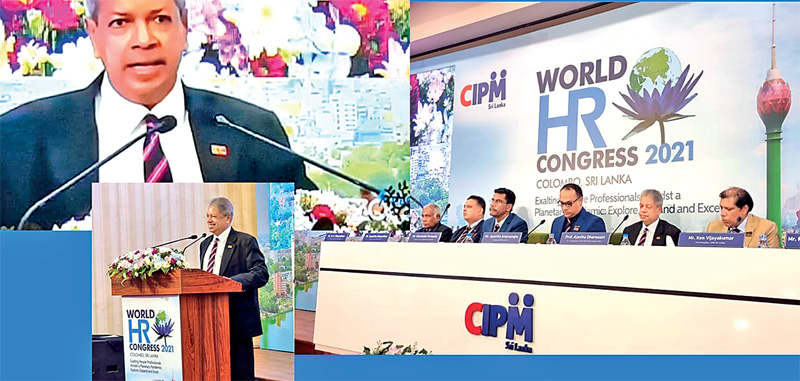Saturday Feb 14, 2026
Saturday Feb 14, 2026
Monday, 13 December 2021 01:20 - - {{hitsCtrl.values.hits}}

Prof. Ajantha Dharmasiri addressing WHRC 2021; also present are CIPM Council Members
|
The HR legend of Asia Prof. T.V. Rao
|
People are not resources but possibilities. Prof. T.V. Rao, the HR legend of Asia said so during the inauguration of the World HR Congress 2021 last Monday. It was indeed thought-provoking to see the evolution of HR from the beginnings of a very narrow personnel management perspective. Today’s column is a reflection of rethinking of HR as ‘human possibilities’.
Overview
I was so glad to be the co-chair of the recently concluded World HR Congress 2021 held as a virtual event. It came with the apt theme, ‘Exalting people professionals amidst a planetary pandemic: Explore, expand and excel’. We were compelled to make it a virtual event due to COVID-19 challenges, having postponed twice. Despite the gloom in economic fronts, we still can be delightful to host such a prestigious event, showcasing what Sri Lanka, as an island of ingenuity can offer to the whole world. Prof. T.V. Rao, as a keynote speaker of the inauguration spoke of the ‘Vistas of Human Possibilities Management’.
It was interesting to note how Prof. Rao referred to Jaggi Vasudev popularly known globally as ‘Sadhguru’. According to this spiritual stalwart, “Human is not a resource. Resources are measurable and anything that is measured limits itself. Human is unlimited, and humans are possibilities.” In fact, he subsequently intensified his claim stating reducing human beings to a resource is a crime. As Prof. Rao further elaborated, mystics are philosophers and conceptually they can say anything as it comes out of deeper reflection and thought and a different understanding of the world of our existence and many other phenomena. Sometimes to understand them requires a fresh approach.
But when I heard this from Sadhguru it has hit me as a good solution to my struggle. I have been struggling all these years to say that HRD specialists or HR as a function’s first focus is on ‘human’. Being human means understanding the unlimited talent (resource) one is born with. It means for HRD facilitators ‘creating conditions for discovering the unlimited talent one is born with and at times even the limits to one’s growth and talent’. Prof. Rao shares it in an interesting manner.
 Relevance to quadruple bottom line
Relevance to quadruple bottom line
As an evolution from now famous triple bottom line involving profit, people and planet, the very term ‘purpose’ capturing the spiritual aspects of ethically dealing with people is added to make it four Ps, thus calling it a quadruple bottom line. It is to recognise the intangible aspects of doing business with a deeper and broader emphasis on ‘value-based’ value-creation.
In a similar line, I came across an interesting argument by Prof. Satish Kalra of Management Development Institute (MDI), India. According to him, treating human beings as a resource to be used, utilised, or manipulated like any other resource is demeaning. Further, with the increasing number of highly skilled knowledge workers, resentment of the word ‘resource’ is likely to increase, since knowledge workers are inclined to be hostile to manipulation. They would prefer the organisation to enable them to fulfil their true potential and, in so doing, help the organisation to achieve its objectives.
Prof. Kalra refers to the dictionary meaning of the term ‘potential’ as ‘capable of coming into being or action’. Human beings by nature are full of energy, capable of thinking and equipped with superior mental abilities; therefore, they are capable of being proactive as opposed to being reactive; their latent energies can ‘come into being’. In fact, the dictionary definition of potential also considers latent energy. “By using their potential, human beings are capable of taking charge of themselves. They need not be directed by external influences,” observes Prof. Kalra.
“With the increase in the number of knowledge workers, employees today would most likely be inclined to develop and exploit their own potential unconditionally.” This is reinforced by the results of many studies. The findings of one such study done in India, indicate that the biggest motivational factor for knowledge workers is ‘personal growth’ followed by ‘operational autonomy’ and then by ‘task achievement’. Among the four major motivators, money was the least motivational factor.
Personal growth is referred to as ‘the opportunity for individuals to realise their potential’, and operational autonomy is defined as ‘a work environment in which knowledge workers can achieve the tasks assigned to them within the constraints of strategic direction and self-measurement indices’. In fact, ‘successful companies in time to come will be those which can motivate employees to use their full talents for the firm’, observes Prof. Karla.
HPM defined
I remember a veteran trade unionist vehemently opposing the use of the term ‘human resources as opposed to ‘human beings’. The HPM definition offered by Prof. Satish Karla might be a consolation for him. “Human potential management is an integrative and continuous process of enhancing human capabilities and capacities by enriching human beings’ existing potential and helping them to discover and tap their latent potential through micro-level human development interventions and macro-level systems and policy interventions to create and sustain an environment.”
As Prof. Kalra highlights, HPM has an underlying belief that if human beings are provided with opportunities to use their potential, they can manage themselves. This in a way is contrary to the belief system underlying HRM which says that human beings must be managed (utilised/used) to achieve organisational objectives. He further differentiates HPM from HRM in several ways:
From potential to possibilities
Despite the wide popular use of HRM, the focus on human potential offers many prospects in unleashing the ‘people power’. As Prof. Jagdish Paarikh in his seminal book, ‘Beyond Leadership’ highlights, such ‘people power’ is manifested in obvious features of a human being. Our eyes can discriminate eight million shades and our ears can discriminate 300,000 tones.
We are blessed with a super-computer brain with immense observing, recording, analysing, recalling and strong capacity equivalent to thousands of contemporary mainframes. Beyond computing, it has almost immeasurable learning, understanding-imaging, creative, and intuitive abilities. The challenge is to use the human potential for the progress individuals as well as institutions.
Possibilities are immense when the unleashing of human potential systematically takes place. Imagination leading to innovation becomes inevitable. High-tech and high-touch harmony will also be possible with proper balancing. With digital disruptions taking place, the demand for human creativity will be on the rise. With flexible structures and higher recognition of people as they are, human possibilities can be unleashed. It requires a shift from an ‘institutional individual’ who adjusts to the rigid organisational requirements to an ‘individualised institution’ that accommodates the flexible people requirements.
“It has put a price on talent and encouraged people to discover and nurture their talent. Subsequently we may be losing the game by gross neglect of the very Human which is the source of all innovation, creative, and technological developments across the globe.” Prof. Rao states in a provocative manner. As he further elaborates, ‘human possibilities’ is a philosophy and a way of looking at people in their context meant to discover, nurture, and utilise human talent or capabilities. It is also meant to discover new contexts for exploration by humans for their and others’ future lives. As he cautions, possibilities are possibilities and are not easily measurable.
Relevance to Sri Lanka
The above discussion should not be a fantasy for us Sri Lankans. When we see many of our brilliant talent excel as expatriates, unleashing of human potential at least in overseas is visible. What barriers prevent us doing so in Sri Lanka? The choice of connections over the competencies has been a perennial issue in the local political arena. There are many instances when kith and kin of those who are at the helm appeared to be the favourites, with regard to filling the key positions. A strategic approach with a holistic perspective is required to ensuring proper ‘human potential management’. That is the sure-fire way to unleash human possibilities with blossoming of creativity and innovation.
“One worthwhile task carried to a successful conclusion is worth half-a-hundred half-finished tasks,” so said Malcolm S. Forbes. What we require is clarity on strategy on one hand and the consistent continuity of execution on the other hand. People factor with proper leadership in action is a key for such endeavour.
(The writer, former Director of Postgraduate Institute of Management, can be reached through [email protected], [email protected] or www.ajanthadharmasiri.info.)